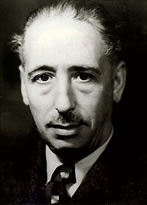<Back to Index>
- Mathematician Siméon Denis Poisson, 1781
- Architect Pier Luigi Nervi, 1891
- President of the Generalitat de Catalunya Lluís Companys i Jover, 1882


Lluís Companys i Jover (June 21, 1882 – October 14, 1940) was the 123rd President of Catalonia from 1934 and during the Spanish Civil War.
He was a lawyer and leader of the political party Esquerra Republicana de Catalunya. Exiled after the war, he was captured and handed over by the Nazi secret police, the Gestapo, to the Spanish dictatorship of Francisco Franco,
who had him executed by firing squad in 1940. Companys is the only
incumbent president of a region in Europe to have been executed, and seventy years later the Spanish state has not yet annulled the council of war which sentenced him. Companys was the son of farmers Josep Companys and Maria Lluïsa de Jover. After getting his law degree from the Universitat de Barcelona, Companys participated in the political life of Catalonia from a young age. In 1906, as a result of the military burning the writings of Catalan newspapers Cu-Cut! and La Veu de Catalunya, and after the passing of the Ley de Jurisdicciones ("Law of Jurisdictions"), which made speech against Spain and its symbols a criminal offence, he participated in the creation of Solidaridad Catalana. Later, he became affiliated to the ephemeral Unió Federal Nacionalista Republicana,
of which he was president of the youth section. He was investigated for
his intense youth activities and was jailed fifteen times, being
classified after the Tragic Week of Barcelona as a "dangerous individual" in police records. With Francesc Layret, Companys represented the left-wing labor faction of the Partit Republicà Català (Catalan
Republican Party), for which he was elected councillor of Barcelona in
1916. In November 1920, he was detained together with Salvador Seguí (known as El Noi del Sucre), Martí Barrera, Josep Viadiu, and other trade unionists and was deported to the Castell de la Mola in Mahón, on Menorca.
Shortly afterward, Layret was assassinated while preparing his defence.
Despite his deportation, in the 1920 legislative elections, Companys
was elected deputy of Sabadell,
taking the place of Layret, who was to have taken that seat prior to
his assassination. This gave him parliamentary immunity, which secured
his release from prison. Companys was one of the founders of Unió de Rabassaires in 1922, for which he worked as a lawyer and director of the magazine La Terra during the years of the regime of Primo de Rivera. Detained again, he was unable to attend the Conferencia de Izquierdas (Conference of Leftists) held between March 12 and March 19, 1931, from which was born the political party Esquerra Republicana de Catalunya;
however, he was elected as an executive member of that party,
representing the Partit Republicà Català. Thanks to the
bonds between the Spanish labor movement and the Spanish union
movement, the election of Companys to this position gave the Esquerra
Republicana de Catalunya (ERC) great prestige amongst left-wing public
opinion, whereas before, it had been considered a party of the small
progressive bourgeoisie. On
October 6, 1934, Companys led a Catalan Nationalist uprising against
the center and right-wing republican government, and proclaimed the
Catalan State (Estat Català), an action for which he was arrested and sentenced to thirty years in prison. However, after the 1936 election and the victory of the left-wing coalition Frente Popular, he was set free by the new government. When the Spanish Civil War began shortly after, in July 1936, Companys sided with the Republic against the Nacionales rebels and was instrumental in organizing a collaboration between the Central Committee of Anti-Fascist Militias, which was sponsored by his Catalan government, and the Workers' Party of Marxist Unification (POUM), a revolutionary anti-Stalinist Communist party, and the Confederación Nacional del Trabajo (CNT), an Anarchist Syndicalist trade union. During the war, Companys attempted to maintain the unity of his political coalition, but after the Soviet Union consul, Vladimir Antonov-Ovseenko, threatened that his country would cut off aid to Catalonia, he sacked Andres Nin from his post as minister of Justice in December 1936. Exiled to France in 1939 after the Civil War, he was arrested and extradited by Nazi German authorities to the Spanish government in September 1940. Companys was executed, after a military trial lacking legal guarantees, at Montjuïc Castle on October 14, 1940. He is buried in the Cementiri del Sud-Oest (Southwest Cemetery), near the castle. The main stadium used for the 1992 Summer Olympics, located on Montjuïc, is officially named in his memory. In 1998 a monument to Companys was installed near Arc de Triomf, on Passeig de Lluís Companys in Barcelona.